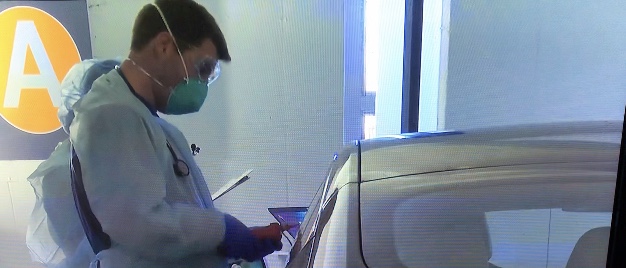By Emma Dugas, Vitals contributor
Power cords, data cables and sanitation supplies topped Raymond Fellers long list.
No, Fellers wasn’t preparing to isolate during the COVID-19 outbreak—quite the opposite—he was opening the first ever “car clinic” at the Palo Alto Medical Foundation’s San Carlos Center. One of several across the Sutter network, the car clinic is designed as an in-person option for PAMF patients with serious respiratory symptoms who have already talked to a provider by phone or video visit.
“We’re solving two problems at once,” said Dr. Rob Nordgren, M.D., MBA, MPH and area CEO of PAMF peninsula region. “By keeping potentially contagious people in their car it means that doctors can assess and treat their symptoms, while minimizing exposure to patients who need routine or urgent care inside the medical facility.”

Making use of a covered garage, a procession of patients – each in their personal car – flowed through a series of stations that comprised the clinic. Every station had a laptop connected to Sutter’s electronic health record and the basic medical equipment you’d find in a regular exam room. A portable X-ray machine was even set up outside to help diagnose lung infections.
Arnold Layung, a licensed vocational nurse who usually sterilizes instruments during surgery, brought his sanitation skills to the car clinic.

“The key here, just like in the operating room, is to have one person per job so no steps are missed,” remarked Layung as he disinfected stethoscopes and other equipment after each use. Filling the role of medical technician, Layung was paired with a physician and registered nurse to form a three-person team—each in full gowns, goggles, gloves and masks—who saw patients through their open car window or in a chair just outside their vehicle.
With a background in emergency medicine, Dr. Nathan Bornstein knows the importance of conserving hospital capacity for those with acute illness. “My job out here is to find the people who need to be escalated to a higher level of care, while also helping people manage serious symptoms so they can safely return home,” he said.
Many of the patients who came through the car clinic had existing respiratory conditions, like asthma, which make them prone to serious breathing difficulty if their lungs are put under added strain. For these patients showing symptoms of a virus, Dr. Bornstein ordered a flu test. In accordance with Centers for Disease Control and Prevention guidelines, Dr. Bornstein also collected samples for COVID-19 testing from symptomatic patients in high-risk groups, such as those with certain pre-existing conditions, epidemiologic or social risk factors.
Dr. Bornstein listened to each patient’s lungs, and if indicated, ordered X-ray or CT scans to detect infection. Finally, Dr. Bornstein reviewed current medications to determine if a dosage change or new prescription would help ease a patient’s symptoms enough to keep them out of the hospital.
Every person had their temperature, respiration rate, heart rate and oxygen saturation checked and each left with a personalized plan for what to do if their symptoms worsened.
PAMF’s San Carlos Center is one location within Sutter Health’s integrated network that supports car clinics. This service is not available in all locations, nor is it open to the general public.
Sutter encourages patients who feel ill to schedule a video visit or call their doctor to receive guidance. If one’s symptoms are mild to moderate, they are encouraged to stay home to rest, get well and prevent exposure to others.
For more information about COVID-19, please visit Sutter Health’s resources page.





